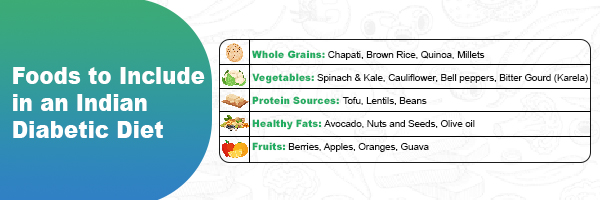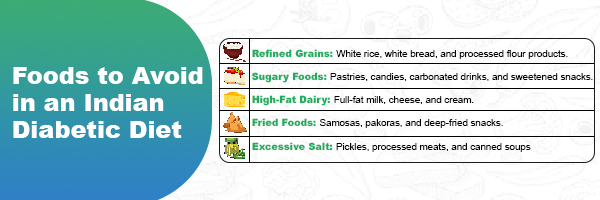
Subscribe to our

Diabetes is a chronic condition that requires careful management of blood sugar levels. One of the most crucial aspects of managing diabetes is maintaining a healthy diet. In India, where food plays a significant role in culture and daily life, it's essential for diabetic patients to have a diet plan tailored to their needs.
In this blog, we'll explore the importance of meal planning for diabetic patients, discover the tips for designing an Indian diabetes-friendly diet, know about the foods to include and avoid, understand the role of diet plans in diabetes management, and provide an example of an ideal Indian diet chart for diabetic patients.
You can also reach out to Felix Hospital today to arrange a consultation with our team and begin the journey toward creating a tailored Indian food diet chart for diabetic patients, Contact us at +91 9667064100.
Meal planning is crucial for individuals with diabetes because it plays a key role in controlling blood sugar levels and managing weight. When someone has diabetes, their body struggles to regulate blood sugar properly. By carefully planning meals, they can help keep their blood sugar levels stable throughout the day.
One important aspect of meal planning for diabetics is maintaining consistent meal timing. Eating meals and snacks at regular intervals throughout the day can help prevent sudden spikes or drops in blood sugar levels.
Another essential component of meal planning for diabetics is portion control. Controlling portion sizes helps prevent overeating, which can lead to high blood sugar levels and weight gain.
In addition to managing blood sugar levels, a well-planned diabetic diet can also improve overall health. By including a variety of nutrient-rich foods, individuals with diabetes can ensure they are getting essential vitamins, minerals, and antioxidants needed for optimal functioning of the body. This can help reduce the risk of other health problems, such as high blood pressure, high cholesterol, and inflammation, which are common in people with diabetes.
By following a well-planned diabetic diet that focuses on consistent meal timing, portion control, and nutrient-rich foods, individuals with diabetes can better regulate their blood sugar levels, manage their weight, and improve their overall health and well-being. If you are searching the best hospital for diabetes care to help you manage and treat diabetes effectively, consider visiting Felix Hospital.
Crafting a diabetes-friendly diet tailored to Indian cuisine presents unique challenges and opportunities. Discover simple ways to design a diabetes-friendly Indian diet with these helpful tips.
Emphasize whole grains: Prioritize whole wheat, oats, barley, and brown rice in your meals to stabilize blood sugar levels and enhance feelings of fullness. These grains provide essential Nutrients and Fiber crucial for a balanced vegetarian diet.
Load up on vegetables: Incorporate a variety of non-starchy vegetables such as spinach, broccoli, cauliflower, and bitter gourd into your meals. These veggies are low in calories and packed with Fibers, vitamins, and minerals, aiding in digestion and overall health.
Opt for plant-based proteins: Choose plant-based protein sources like tofu, legumes (such as lentils, chickpeas, and beans), and tempeh to meet your protein needs. These options are low in saturated fats and cholesterol, supporting muscle health and promoting satiety.
Minimize added sugars: Reduce your intake of sugary beverages, sweets, and desserts. Instead, sweeten foods naturally with fruits or use alternatives like stevia. This helps control blood sugar levels and lowers the risk of developing complications related to diabetes.
Watch portion sizes: Pay attention to portion sizes to avoid overeating and manage calorie intake effectively. Using smaller plates, measuring portions, and being mindful of serving sizes can assist in maintaining a healthy weight and blood sugar levels.
Here are five foods that are beneficial to include in an Indian food diet chart for diabetic patient, along with details on their health benefits:

Whole Grains: You can include whole grains like chapati, brown rice, quinoa, and millets in your diabetic diet for stable blood sugar levels. Chapati provides fiber, brown rice offers vitamins and minerals, quinoa is high in protein, and millets are gluten-free and rich in nutrients. Incorporate these grains for a balanced and nutritious approach to managing diabete
Vegetables: Include a variety of vegetables in your diabetic plan for optimal health and blood sugar control. Nutrient-rich options like spinach, kale, cauliflower, bell peppers, and bitter gourd offer vitamins, minerals, and fiber while being low in calories and carbohydrates. These vegetables support digestion and help stabilize blood sugar levels, providing essential nutrients for overall well-being.
Protein Sources: Incorporate diverse protein sources into your diabetic diet plan for stable blood sugar levels and overall health. Tofu, lentils, and beans offer essential nutrients like protein and fiber while helping regulate blood sugar levels effectively.
Healthy Fats: You can add healthy fats into your diabetic diet plan for heart health and overall well-being. Avocado, nuts, seeds, and olive oil provide essential nutrients like monounsaturated fats and antioxidants, which support improved insulin sensitivity and reduced inflammation.
Fruits: A variety of fruits can also be included in your diabetic plan for sweetness without spiking blood sugar levels. Berries offer fiber and antioxidants, while apples provide soluble fiber for blood sugar regulation. Oranges offer vitamin C and hydration, and guava boasts fiber and essential nutrients. These fruits support stable blood sugar levels and overall health in your diabetic diet.
Including these foods in a vegetarian Indian diabetic diet can help individuals manage their blood sugar levels effectively while enjoying a variety of delicious and nutritious meals.

Refined Grains: In an Indian diabetic diet, steer clear of refined grains like white rice, white bread, and processed flour products. These foods can cause rapid spikes in blood sugar levels. Opt for whole grains for better blood sugar regulation and improved overall health.
Sugary Foods: Avoid sugary foods such as pastries, candies, carbonated drinks, and sweetened snacks in an Indian diabetic diet. These items can cause rapid increases in blood sugar levels, leading to complications. Opt for healthier alternatives to satisfy cravings while managing blood sugar effectively.
High-fat Dairy: Limit high-fat dairy products like full-fat milk, cheese, and cream in an Indian diabetic diet. These items are high in saturated fats, which can increase the risk of heart disease, a common complication of diabetes. Choose low-fat or fat-free dairy options to reduce saturated fat intake and support heart health while managing blood sugar levels effectively.
Fried Foods: Avoid fried foods such as samosas, pakoras, and deep-fried snacks in an Indian diabetic diet. These foods are typically high in unhealthy fats and calories, which can contribute to weight gain and insulin resistance. Instead, opt for healthier cooking methods like baking, grilling, or steaming to reduce fat intake and better manage blood sugar levels.
Excessive Salt: Reduce consumption of foods high in salt, such as pickles, processed meats, and canned soups, in an Indian diabetic diet. Excessive salt intake can elevate blood pressure, increasing the risk of heart disease, which is common among individuals with diabetes. Opt for fresh, whole foods and season meals with herbs and spices instead of salt to flavour your dishes while maintaining better blood sugar control and overall health.
Crafting an effective diabetic diet plan is crucial for managing the condition optimally. It emphasizes balanced meals, portion control, and mindful food choices to regulate blood sugar levels and enhance overall health. Here are some key characteristics of an ideal diabetic diet plan;
Fit your personal needs.
Balance your meals.
Control portion sizes.
Include healthy, nutrient-rich foods.
Keep your blood sugar levels stable.
Support your overall health.
While it's important for a diet plan to be customized based on an individual's personal and medical preferences, below is an example of a well-crafted Indian food diet chart for diabetic patients;
| MEAL | TIME | FOOD INTAKE |
| Breakfast | 8AM TO 9AM | A serving of vegetable upma accompanied by a beverage of choice |
| Mid-Morning Snack | 11AM | A bowl of fresh seasonal fruits such as apples, guavas, or pears |
| Lunch | 1PM TO 2PM | 2 multigrain chapatis, 1 serving of brown rice, a bowl of vegetable curry, dal, salad, and raita |
| Tea Time | 3PM | Black or green tea paired with roasted chana or sprouts |
| Evening Snack | 7PM | A serving of vegetable soup |
| Dinner | 8PM TO 9PM | 2 chapatis, 1 serving of brown rice, a bowl of vegetable curry, dal, and salad |
| Bed Time Snack | 10PM | A glass of turmeric milk |
A well-planned diet plays a crucial role in managing diabetes effectively. By focusing on whole, nutritious foods and avoiding processed and sugary items, diabetic patients can stabilize their blood sugar levels, maintain a healthy weight, and reduce the risk of complications. With careful meal planning and adherence to a balanced diet, individuals with diabetes can lead a fulfilling and healthy life. It's essential to consult with a healthcare professional or dietitian, especially those offering nutrition diet services, before making any substantial changes to your diet.
At Felix Hospital, Noida, we understand the importance of supporting you on your journey to better health, especially when it comes to managing diabetes. Our dedicated team is committed to providing personalized care and guidance every step of the way. With our expertise in healthcare and nutrition, we offer a tailored Indian vegetarian diet chart for diabetic patient vegetarians designed to meet your specific needs and preferences.

Take the first step towards a healthier lifestyle by contacting to best super speciality hospital in Noida, Felix Hospital today at +91 9667064100. Our team at Felix Hospital is ready to assist you in embracing a diabetic diet plan that empowers you to thrive. Remember, your health is our priority, and we are here to support you every step of the way.
Q.1 What is an Indian diet chart for diabetic patients?
Ans. An Indian diet chart for diabetic patients typically includes a balanced combination of carbohydrates, proteins, fats, fiber, and essential nutrients tailored to help manage blood sugar levels. It emphasizes whole grains, vegetables, lean proteins, and healthy fats while limiting refined carbohydrates and sugary foods.
Q.2 How does an Indian diet chart help in managing diabetes?
Ans. An Indian diet chart helps in managing diabetes by regulating blood sugar levels through controlled carbohydrate intake, promoting weight management, improving insulin sensitivity, and reducing the risk of complications associated with diabetes such as heart disease and nerve damage.
Q3. What foods are typically included in an Indian vegetarian diet chart for diabetic patients?
Ans. Foods commonly included in an Indian vegetarian diet chart for diabetic patients are whole grains like brown rice, whole wheat, oats, lentils, legumes, vegetables such as bitter gourd, spinach, broccoli, lean protein sources like chicken, fish, tofu, healthy fats from nuts, seeds, and oils like olive oil.
Q4. Are there specific foods that diabetic patients should avoid in an Indian diet chart?
Ans. Diabetic patients should avoid or limit foods high in refined carbohydrates and sugars such as white rice, white bread, sugary drinks, sweets, fried foods, and excessive consumption of high-fat dairy products.
Q5. How can portion control be incorporated into an Indian diet chart for diabetes?
Ans. Managing diabetes through portion control is vital. In an Indian diet:
Limit grains like rice and bread to small servings, choosing whole grains when possible. Fill up on non-starchy veggies and stick to small fruit portions, opting for low-glycemic options. Choose lean proteins and use healthy fats in moderation. Use measuring tools to control portions and plan meals ahead for consistency. Stay hydrated with water, avoid sugary drinks, and include regular physical activity.
Q6. Are there any traditional Indian foods that can be part of a diabetic diet?
Ans. Yes, traditional Indian foods like dal (lentils), sabzi (vegetable curry), roti (whole wheat flatbread), yogurt (low-fat or Greek), and salads with a variety of vegetables can be included in a diabetic diet.
Q7. How often should diabetic patients follow the Indian diet chart?
Ans. Diabetic patients should ideally follow the Indian diet chart consistently as part of their daily meal planning to effectively manage blood sugar levels.
Q8. Can an Indian diet chart for diabetic patients be customized based on individual preferences?
Ans. Yes, an Indian diet chart for diabetic patients can be customized based on individual preferences, dietary restrictions, cultural preferences, and nutritional requirements while ensuring it aligns with diabetes management goals.
Q9. Are there any specific cooking methods recommended for preparing meals in an Indian diabetic diet?
Ans. Cooking methods such as steaming, boiling, grilling, and stir-frying with minimal oil are recommended to prepare meals in an Indian diabetic diet, while deep-frying and heavy use of oil should be minimized.
Q10. How can one ensure they are getting enough nutrients while following an Indian diet chart for diabetes?
Ans. Indian One can ensure they are getting enough nutrients by including a variety of foods from all food groups, incorporating colourful fruits and vegetables, choosing whole grains over refined grains, opting for lean protein sources, and supplementing with essential nutrients if needed while consulting with a healthcare professional.